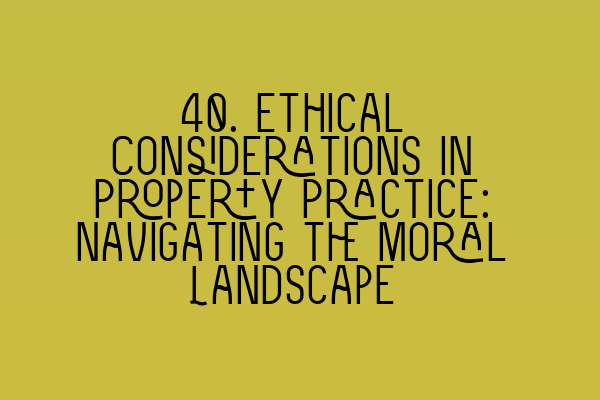Welcome to the blog of SQE Property Law & Land Law! In today’s post, we will delve into the fascinating topic of ethical considerations in property practice. As solicitors, it is not only our duty to provide legal advice and assistance but also to navigate the moral landscape that comes with property law. Let’s explore some of the key ethical considerations that arise in this field.
1. Honesty and Integrity
Being honest and acting with integrity are fundamental ethical principles that guide property practitioners. It is essential to provide accurate and truthful information to clients, ensuring they are fully informed about the legal and financial implications of their property transactions. This includes disclosing any conflicts of interest that may arise during the process.
2. Professional Competence
As property solicitors, maintaining professional competence is crucial to ethically serving our clients. Continual professional development allows us to stay abreast of changes in property law and provide the best possible service. Regularly attending seminars, workshops, and relevant courses, such as the ones offered by SQE Property Law & Land Law, is essential to enhancing our knowledge and skills.
If you are preparing for the SQE 1 or SQE 2 exams, we highly recommend checking out our comprehensive preparation courses offered by SQE Property Law & Land Law. These courses provide comprehensive knowledge and invaluable practice to help you succeed in your exams. You can find more information about SQE 1 and SQE 2 preparation courses on our website.
3. Confidentiality
Confidentiality is a cornerstone of the solicitor-client relationship and an essential ethical consideration in property practice. Solicitors must maintain strict confidentiality, ensuring that any information shared by clients remains confidential, unless authorized by the client or required by law. This confidentiality builds trust and allows clients to be open and honest with their legal representatives.
4. Conflict of Interest
Conflicts of interest can arise in property practice, and it is crucial to address them ethically and transparently. Solicitors must identify and disclose any conflicts of interest to their clients promptly. This allows clients to make informed decisions about whether to proceed with their chosen solicitor or seek legal advice elsewhere.
5. Serving the Public Interest
Property solicitors have a responsibility to serve the public interest and contribute to the betterment of society. This can include pro bono work, providing legal services to individuals or organizations who cannot afford them. By doing pro bono work, solicitors support access to justice and help bridge the gap between those who have legal representation and those who do not.
Want to test your knowledge and preparation for the SQE 1 exams? Check out our practice exam questions designed to help you ace your exams. The SQE 1 practice exam questions are a valuable resource for assessing your understanding and identifying areas for improvement. Click here to access SQE 1 practice exam questions.
6. Cultural Sensitivity and Diversity
Cultural sensitivity and promoting diversity are integral to ethical property practice. Solicitors must treat all clients with respect, fairness, and without discrimination. By understanding and valuing different cultures and embracing diversity, solicitors can forge stronger connections with clients and provide more inclusive solutions.
7. Environmental Considerations
Property practitioners should also consider the environmental impact of property transactions. Ethical property practitioners strive to promote sustainable practices, such as encouraging clients to invest in eco-friendly properties or supporting initiatives that minimize carbon footprints. It is important to consider the long-term consequences of property transactions on the environment.
Looking for SQE 1 or SQE 2 exam dates? Visit our website to find the latest SRA SQE exam dates and stay updated on when the exams are scheduled to take place. Planning your study schedule and preparation around the exam dates is crucial for success in your SQE exams.
In conclusion, ethical considerations play a vital role in property practice. By adhering to principles such as honesty, integrity, confidentiality, and serving the public interest, property solicitors can ensure that they provide ethical and responsible legal services to their clients. Navigating the moral landscape in property law requires constant evaluation and commitment to upholding the highest ethical standards.
If you’re interested in learning more about the ethical considerations in property law or preparing for the SQE exams, SQE Property Law & Land Law offers comprehensive preparation courses for both SQE 1 and SQE 2. Visit our website to learn more about our SQE 1 and SQE 2 preparation courses.
